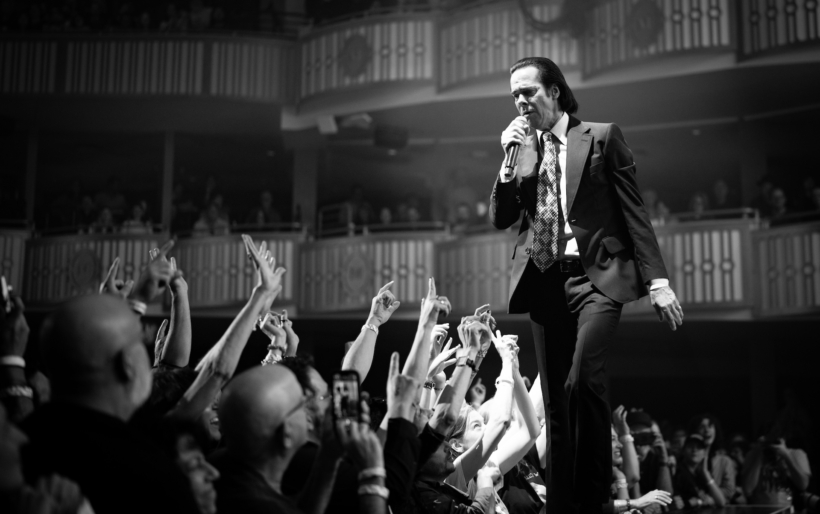I consider myself a punctual person—a strict adherent of “if you’re not 15 minutes early, you’re late” type of guy, yet as I approached The Met’s shining marquee (40 minutes early, mind you) I still felt like I was late to the party. The line was wrapped around the block; people were grilling, selling food, and everyone was chatting about only one thing: Is Nick Cave secretly a vampire?
Ok, not really. Cave certainly exudes that energy, though. It’s the slicked back, pitch black hair. It’s his imposing yet heartrending vocal baritone. It’s that inspired songwriting style as if he’s watched the world spin for thousands of years and can see the aerial patterns of time in a way mere mortals simply can not comprehend. In reality, Cave is a musician well and wise into the fourth decade of his artistic career. Last year, Cave and the Bad Seeds released their 18th studio album, the Grammy nominated Wild God, once more refusing creative stagnancy and furthering a catalog of sometimes witty, sometimes belligerent, and always stirring musical manifestations. His performance last Saturday night was where these manifestations came to life, showcasing both his current Wild God conscience and the countless chronicles of Nick Cave’s inner identity.
The 10 piece band (11 counting Cave) kicked off the evening with the opening moments from Wild God. “Frogs” came first, a potent jam of free flowing piano runs and choir vocals that raised the crowd from their seats and into a grand introductory applause. After a classic Philly-style taunt from an audience member, Cave joked that, in fact, he was stuck in the venue with the audience and not the other way around, then jumped into “Wild God.” The title track brought an equally prodigious performance as each hit of the “bring your spirit down” refrain sent shockwaves of belted elation through the seats. “Song Of The Lake” finished the band’s sonic preamble as Cave explained that he wrote the piece as a cautionary tale, going as far as to dissuade any impressionable fans from trying any of what he says at home.
Cave naturally fills the spotlight of the stage with his crowd involvement and fancy footwork, but as I settled in for the remainder of the night and scanned the stage, my eyes fell inquisitively on the bassist. The sunbursted Fender P-bass, the crunchy and muted tone—even from afar I would know that profile anywhere: Colin Greenwood, bassist of Radiohead. Was his being there consequential to the show? No, not really. Was I taken aback by seeing one-fifth of Radiohead playing as one of the Bad Seeds? Absolutely. Not only has Greenwood been playing with the band going on two years, but he contributed to the recordings for Wild God as well. I usually hate to be the one out of the loop, but the power of Greenwood’s bass playing against Cave’s inherent vocal ferocity was worth every bit of that brief moment of ignorance.
The band fled into the sermon of “O Children” soon after—the crowd following every word in a hushed unison for what remains Cave’s most renowned song to date. He explained how he was blaming and hating humanity for being unable to protect its children, how the world can’t look after its own creations, and how it all came to him while watching his own kids playing outside. “O Children” is a piece that continues to find its theme regardless of the context, and Cave relayed this harsh dichotomy of failure and consequence with a feeling of hope in a way that’s accessibly, innately human.
In Cave’s moments of deep flowstate storytelling; moments like the band’s performance of “Jubilee Street” and the Peaky Blinders lauded “Red Right Hand,” I’m reminded of a young Bob Dylan. They’re both expert narrators, yet unreliable in their anger and overwhelming pathos. Still, they speak their truth, allowing others to interpret it as they will. In renditions of tracks like “Joy,” “I Need You,” and “Long, Dark, Night,” however, Cave’s stark subtlety is more akin to a writer like Leonard Cohen. Here, Cave refrains from grandeur, singing softly with his piano and dwelling on every clever turn of phrase. I could see the tears well up in his eyes as he sang, almost enough to picture the memories that inspired each composition. While harrowing to watch, it was clear that this was Cave’s catharsis, an emotional distress that can only be expelled through song, and there’s true beauty in that.
By the latter half of the set, Cave and the band had ascended past the point of sermon and into full-blown rapture. From the tide of cymbal rushes throughout “Bright Horses” to the ideological back-and-forth of “Cinnamon Horses,” every subsequent track heightened the tension of the room as the audience watched on in awe. But as the Bad Seeds stepped off stage in preparation for the encore, these feelings reached a boiling point. Cave came out and began to play “Skeleton Tree,” a track that he noted has only been recently added back to the touring setlist, and one rife with the pain of loss and death. In 2015, a year before “Skeleton Tree” was released, his son Arthur died at the age of 15, and furthering his reservations over the track, his son Jethro died in May of 2022, at only 31. The audience offered a kind respite from the weight of the song, allowing Cave to simply play piano and reflect as they sang the words to “Into My Arms” during the final moments of the concert. The echoes slowly faded out as Cave thanked the crowd one final time and said goodnight. I swear I saw a bat on my way home too.


